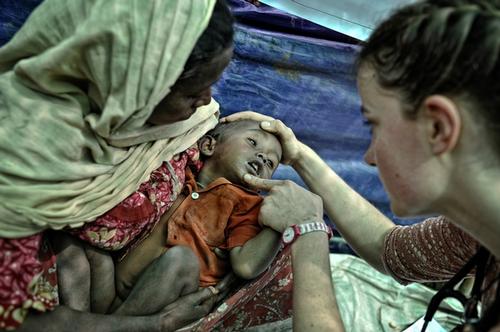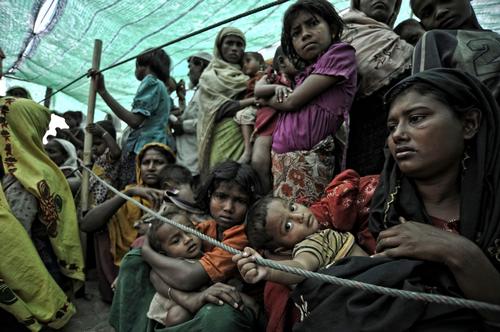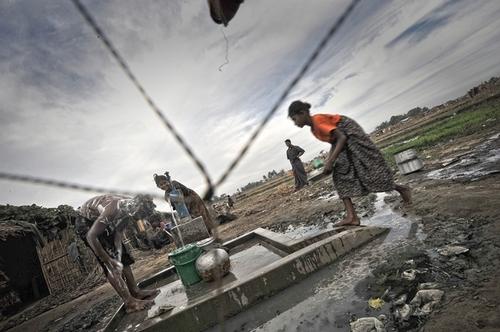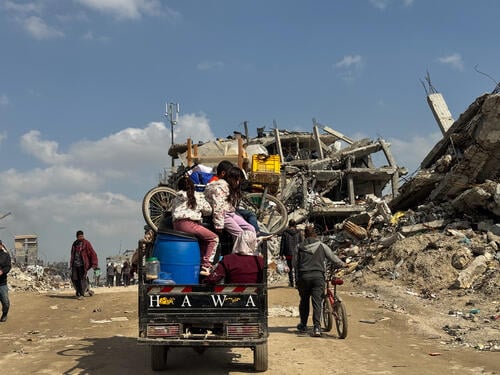Yangon/Amsterdam, 7 February 2013 —Eight months since deadly communal clashes first broke out in Rakhine state, Myanmar, tens of thousands of people are still unable to access urgently needed medical care. Médecins Sans Frontières (MSF) calls on government authorities and community leaders to ensure that all people in Rakhine are able to live without fear of violence, abuse and harassment, and that humanitarian organisations can assist those most in need.
Since the June and October outbreaks of violence, communities that were previously living side by side, or even mixed, remain deeply divided. Thousands of people have lost their homes and are living in makeshift camps, cut off from healthcare, clean water and basic provisions. According to official estimates, the vast majority of the displaced are a Muslim minority – often referred to as the Rohingya.
“It is among people living in makeshift camps in rice fields or other crowded strips of land that MSF is seeing the most acute medical needs,” said Arjan Hehenkamp, MSF General Director. “Ongoing insecurity and repeated threats and intimidation by a small but vocal group within the Rakhine community have severely impacted on our ability to deliver lifesaving medical care.”
“We are very worried about our women,” said a man living in a displaced persons camp in Pauktaw township, Rakhine state. “We have more than 200 pregnant women in our camp. For their delivery they cannot go to a health centre and they will have to deliver here… in the mud, without a doctor.”
Skin infections, worms, chronic coughing and diarrhoea are the most common ailments seen through more than 10,000 medical consultations in the camps since October. Malnutrition rates vary, but in several camps MSF’s rapid screening shows alarming numbers of severely malnourished children.
Although clean water is often available in sufficient quantities, some of the displaced are denied access to it. “The only drinking water pond we have is the one that we have to share with the cattle of the nearby village. Five minutes from here is a pond with crystal clear water. We don’t dare to go,” said a man living in a displaced persons camp in Pauktaw township, Rakhine state.
While needs remain acute, MSF medical teams face continued threats and hostility. In pamphlets, letters and Facebook postings, MSF and others have been repeatedly accused by some members of the Rakhine community of having a pro-Rohingya bias. It is this intimidation, and not formal permission for access, that is the primary challenge MSF faces. The authorities can, however, do more to make it clear that threatening violence against health workers is unacceptable.
“Our repeated explanations that MSF only seeks to provide medical aid to those who need it most is not enough to forestall the accusations,” said Hehenkamp. “MSF urges supportive community leaders and government authorities to do more to counteract the threats and intimidation so that humanitarian aid can be delivered to those who urgently need it.”
Across Myanmar, MSF provides more than 26,000 people with lifesaving antiretroviral treatment for AIDS and was among the very first responders to cyclones Nargis and Giri, providing medical assistance and survival items and cleaning water sources for tens of thousands of people.
MSF has worked in Rakhine state for the past twenty years, providing basic and reproductive healthcare as well as HIV/AIDS and tuberculosis treatment. Prior to June, MSF had been conducting approximately 500,000 medical consultations annually. Since 2005, MSF has treated more than 1.2 million people from all ethnic groups in Rakhine state for malaria.
Note
In June 2012, deadly communal clashes led to Myanmar’s Rakhine State being placed under an official state of emergency. An estimated 75,000 people were displaced – many of whose homes had been burned down. Further outbreaks of violence in October exacerbated the humanitarian crisis, forcing a further estimated 36,000 people out of their homes and into makeshift camps, which do not have sufficient shelter, water, sanitation, food or healthcare. Hundreds of thousands more people, still living in their homes, have found themselves without healthcare as medical services were cut off, and in many areas still have not resumed.






